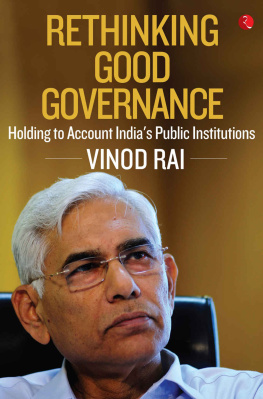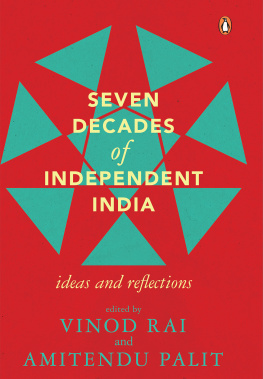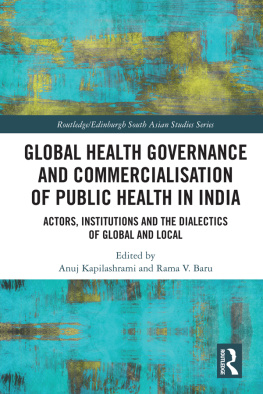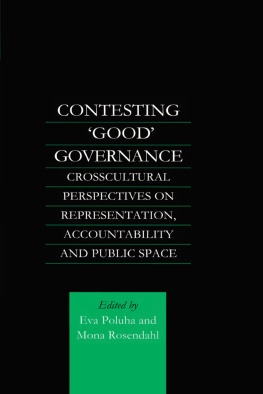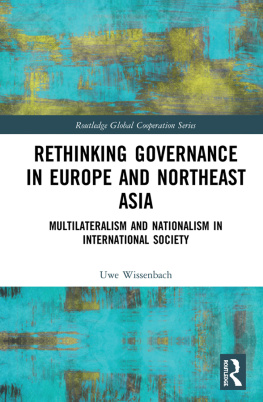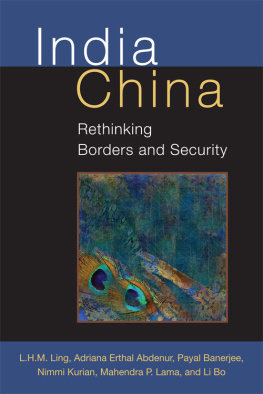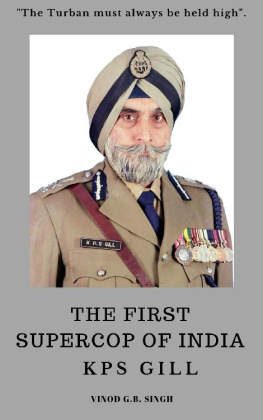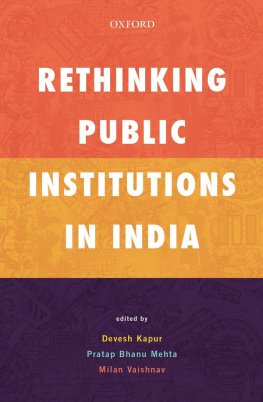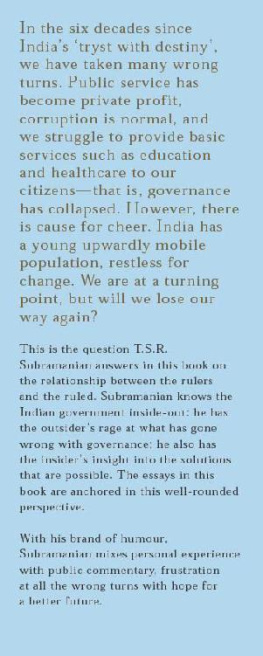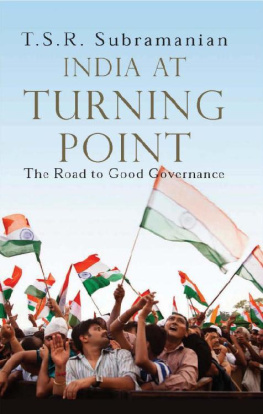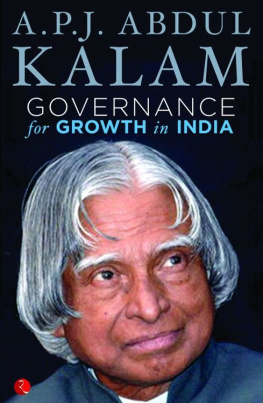Vinod Rai - RETHINKING GOOD GOVERNANCE: Holding to Account India’s Public Institutions
Here you can read online Vinod Rai - RETHINKING GOOD GOVERNANCE: Holding to Account India’s Public Institutions full text of the book (entire story) in english for free. Download pdf and epub, get meaning, cover and reviews about this ebook. year: 2019, publisher: Rupa Publications, genre: Politics. Description of the work, (preface) as well as reviews are available. Best literature library LitArk.com created for fans of good reading and offers a wide selection of genres:
Romance novel
Science fiction
Adventure
Detective
Science
History
Home and family
Prose
Art
Politics
Computer
Non-fiction
Religion
Business
Children
Humor
Choose a favorite category and find really read worthwhile books. Enjoy immersion in the world of imagination, feel the emotions of the characters or learn something new for yourself, make an fascinating discovery.
RETHINKING GOOD GOVERNANCE: Holding to Account India’s Public Institutions: summary, description and annotation
We offer to read an annotation, description, summary or preface (depends on what the author of the book "RETHINKING GOOD GOVERNANCE: Holding to Account India’s Public Institutions" wrote himself). If you haven't found the necessary information about the book — write in the comments, we will try to find it.
Vinod Rai: author's other books
Who wrote RETHINKING GOOD GOVERNANCE: Holding to Account India’s Public Institutions? Find out the surname, the name of the author of the book and a list of all author's works by series.
RETHINKING GOOD GOVERNANCE: Holding to Account India’s Public Institutions — read online for free the complete book (whole text) full work
Below is the text of the book, divided by pages. System saving the place of the last page read, allows you to conveniently read the book "RETHINKING GOOD GOVERNANCE: Holding to Account India’s Public Institutions" online for free, without having to search again every time where you left off. Put a bookmark, and you can go to the page where you finished reading at any time.
Font size:
Interval:
Bookmark:
RETHINKING
GOOD
GOVERNANCE
Praise for the Book
Here is a hugely important book for India and Indians, especially those who should be the guardians of the nation and rulers delivering good governance. Vinod Rai has been at the centre of the structure which counts as the State. He has now exposed the various faults and failures from which the structure suffers.
Lord Meghnad Desai,
Life Peer at the House of Lords
Anyone seeking to understand the workings of the Indian government should read Rethinking Good Governance. This lucid and observant volume offers detailed and scholarly analyses of the countrys key accountability agenciesfrom the Parliament to temple administrationwhose functions underpin and affect all facets of life in India. Written with the incisive insights of an insider, Vinod Rai provides a balanced and honest assessment of the public institutions that constitute the pillars of the Indian State and explains how their functioning or failures have come to define the state of parliamentary democracy and governance in India.
Professor Tan Tai Yong,
President, Yale-NUS College
Unlike China, India has taken the more difficult path of building a democracy along with economic growth. Its democratic institutions are challenged by loosening animal spirits of both its businesses and its politicians. Reining them in is often necessary. Vinod Rais candid book presents challenges and solutions.
Arun Maira, business leader; Chairman,
HelpAge International; and former member of Indias Planning Commission

Published by
Rupa Publications India Pvt. Ltd 2019
7/16, Ansari Road, Daryaganj
New Delhi 110002
Copyright Vinod Rai 2019
The views and opinions expressed in this book are the authors own and the facts are as reported by him which have been verified to the extent possible, and the publishers are not in any way liable for the same.
While every effort has been made to trace copyright holders and obtain permission, this has not been possible in all cases. References of the works consulted by the author has been provided, but it is possible that it may contain unintentional omissions. Any error brought to our attention will be remedied in future editions.
All rights reserved.
No part of this publication may be reproduced, transmitted, or stored in a retrieval system, in any form or by any means, electronic, mechanical, photocopying, recording or otherwise, without the prior permission of the publisher.
ISBN: 978-93-5333-631-8
First impression 2019
10 9 8 7 6 5 4 3 2 1
The moral right of the author has been asserted.
This book is sold subject to the condition that it shall not, by way of trade or otherwise, be lent, resold, hired out, or otherwise circulated, without the publishers prior consent, in any form of binding or cover other than that in which it is published.
CONTENTS
FOREWORD
By Pranab Mukherjee
Global history is replete with examples where economic-development effort in countries could not be sustained over time due to the lack of a good governance platform that could incubate and nurture developmental efforts. Indias experience of a vibrant parliamentary democracy is targeted at ensuring an inclusive development agenda that seeks to empower people and promote transparency in administration.
Policy formulation is certainly the prerogative of any elected government. However, what are the responsibilities and duties factored into this power? Is there total discretion, with no accountability imposed upon the persons exercising this power? Do the people who elect them not have the right to expect a certain ethical standard from those who exercise this fiduciary trust? The time has come that these questions need to be asked and have to be answered by those in positions of power. This is fundamental for the preservation of our nation and a truly democratic society. Democracy will be the loser if those in power cease to hear voices other than their own.
Our governance systems have been strengthened by democratic decentralization and the active participation of people in the process of administration. The introduction of local self-government at the grass-roots level has empowered people to ensure transparency and accountability at all levels of administration. It has introduced the element of vigilante in the devolution of public funds and projects, thereby ensuring minimum leakage.
Despite these remarkable achievements, critical gaps in the public decision-making process remain. There is a pressing need, on the one hand to improve organizational capabilities to cater to the increasing demand for services and improvement in the quality of service delivery, and on the other, to improve transparency and accountability. We, therefore, urgently need innovative solutions that will ensure a quantum leap in governance standards.
Considering his long and distinguished innings in public life, Vinod Rai is an eminently suited person to lead this discourse, which holds Indias public institutions to account and paves the way for a more active, responsive, sustainable and efficient administration for the country at all levels of the government. Rethinking Good Governance is an incisive and objective analysis of Indias public institutions, which mirror our national character.
In the last seven decades, the country has established a successful parliamentary democracy, an independent judiciary and strong institutions such as the Election Commission of India, the Comptroller and Auditor General, the Central Vigilance Commission and the Central Information Commission, which sustain and support our democratic structure. However, in the recent past, these institutions have come under severe strain and their credibility has been questioned. There is widespread cynicism and disillusionment with their governance and functioning. This book helps understand the correctives that can restore credibility and win back peoples trust to save Indias democracy.
Rai presents a scholarly analysis of each of these institutions. He traces their history, highlights their inherent strengths and flaws, offers suggestions to counter their deficiencies and explains how the credibility of these institutions get eroded and how it can be restored.
I have always maintained that disruption in the Parliament is a betrayal of the commitment made to the people. It also provides a helping hand to the government by scuttling the Opposition space. The country needs a parliament that debates, discusses and decides, and not disrupt. The temple of democracy must also provide better oversight over the government.
As an upholder of the rule of law and an enforcer of the right to liberty, the role of the judiciary is sacrosanct. The faith and confidence people have in the judiciary must always be maintained. We need a judiciary that gives justice without delay. It is for this reason that the Constitution invests our independent judiciary, especially the Supreme Court, with extensive jurisdiction over the acts of the legislature and the executive. It is the judiciary that ensures the effectiveness of judicial review. However, judicial activism should not lead to the dilution of the separation of powers, which is a constitutional scheme.
A few months ago, I expressed concern over the alleged tampering and suspicious movement of Electronic Voting Machines (EVMs). The onus of ensuring institutional integrity lies with the Election Commission, and I insisted that the institution put all speculation to rest. After all, only the workmen decide how the institutional tools perform. Fortunately, the position was clarified by a competent authority and the public was assured of the safety and security of the machines that recorded the votes in the last Lok Sabha elections.
Next pageFont size:
Interval:
Bookmark:
Similar books «RETHINKING GOOD GOVERNANCE: Holding to Account India’s Public Institutions»
Look at similar books to RETHINKING GOOD GOVERNANCE: Holding to Account India’s Public Institutions. We have selected literature similar in name and meaning in the hope of providing readers with more options to find new, interesting, not yet read works.
Discussion, reviews of the book RETHINKING GOOD GOVERNANCE: Holding to Account India’s Public Institutions and just readers' own opinions. Leave your comments, write what you think about the work, its meaning or the main characters. Specify what exactly you liked and what you didn't like, and why you think so.

